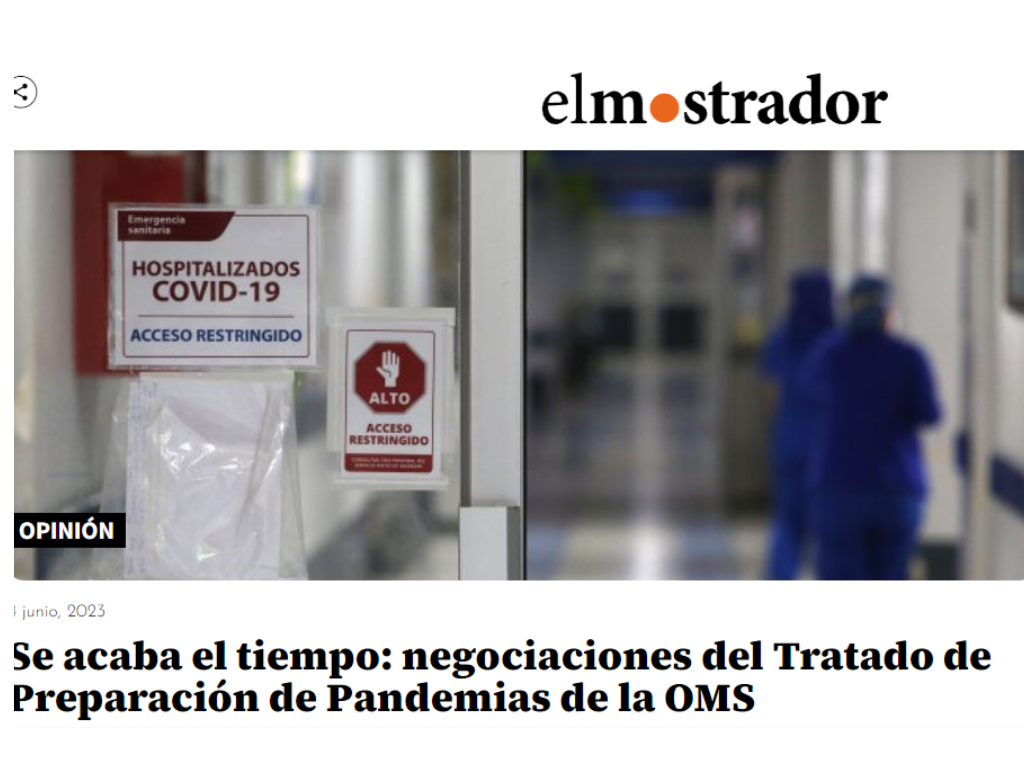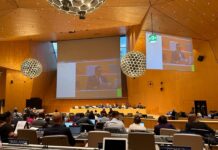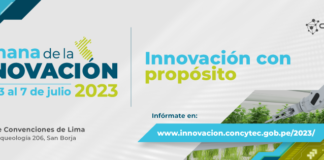We invite you to read the opinion article “Time is running out: WHO Pandemic Preparedness Treaty negotiations” by Director Luis Villarroel, published in the newspaper El Mostrador, you can read it here or below:
It is important for the process to be transparent and to be inclusive. Based on this premise, international civil society has expressed concern about the lack of actual opportunities for engagement. They also expressed concern about the lack of transparency in the negotiations and the lack of access to the texts under discussion, which are kept secret and only released periodically.
In negotiating the International Instrument for Global Pandemic Preparedness and Response, member countries of the World Health Organization (WHO) have a great opportunity to reach an effective international agreement to prepare the world for future pandemics, but it is not certain that they will succeed. Originally proposed by Chile and Europe, the initiative’s goal is to establish a legal framework to guide nations in pandemic preparedness and response. However, with deep disagreements between countries and only 12 months to reach an agreement, it is becoming more likely that the final text will prove inadequate.
Ongoing negotiations in the WHO Intergovernmental Negotiating Body, held in a series of public and private sessions, have resulted in two consolidated texts known as the Zero Draft. The existing tensions and different perspectives are reflected in the latest of these drafts, leaked on May 23. Among the proposals, one of the most controversial is to tie disclosure and access to the genetic material of pathogens to access to the benefits derived from such information. Specifically, it proposes the possibility of setting minimum percentages that would guarantee developing countries access to vaccines or treatments derived from the genetic material of these pathogens. This proposal aims to avoid situations in the past where countries that provided genetic samples did not have access to the resulting treatments or vaccines.
Other aspects of the document are drawing opposition from some multinational pharmaceutical companies. One is the call for greater transparency in the terms of contracts for the provision of vaccines and treatments, as well as in pricing and public financing. During the COVID-19 pandemic, abuses and practices against the public interest were witnessed, which motivated the need to address this issue. The nature or composition of supply chains is also discussed, as are technology transfer obligations or commitments, particularly in the case of publicly funded research results.
As usual, the possibility of restricting intellectual property rights in times of pandemic to speed up technology transfer and the use of production capacity is also controversial. During the Covid-19 pandemic, a partial solution was achieved through a moratorium on certain vaccine intellectual property rights. However, this did not include treatments or medical devices, so this issue requires further study and analysis. According to civil society, how references to the protection of human rights are included is problematic.
The inclusion of the relationship between animal health and the environment as an issue to be monitored and addressed in pandemic preparedness is also controversial. The phenomenon of cross-contamination between species and antibiotic resistance due to veterinary use or toxic waste must be considered. Developing countries, led by African nations, believe it is essential to ensure a mechanism for sharing the benefits of genetic resources and to limit intellectual property rights to ensure equity in future pandemics. However, these proposals are strongly opposed by large pharmaceutical companies, backed by some Western powers who regard access to these pathogens as a security issue. The debate on whether the exchange of information on new pathogens should be linked to some kind of benefit, possibly monetary, is still under discussion. The Global South has the strongest claim in this regard, arguing for the inclusion of this linkage to benefits. Outright rejection by the Global North could mean the loss of timely access to such pathogens, delaying the development of vaccines or targeted treatments and costing lives.
Time constraints are also a major challenge in the treaty negotiations. Although it was agreed in December 2021 that a pandemic treaty would be negotiated by May 2024, the process got stalled over procedural issues.
Given the scope of the issues under discussion and their controversial nature, the May 2024 deadline presents us with the dilemma of either maintaining the ambition to include all the relevant aspects in the treaty, which could delay its drafting, or lowering expectations and reaching minimum agreements that could prove insufficient within the given timeframe.
It is important for the process to be transparent and to be inclusive. Based on this premise, international civil society has expressed concern about the lack of actual opportunities for engagement. They also expressed concern about the lack of transparency in the negotiations and the lack of access to the texts under discussion, which are kept secret and only released periodically.
Unfortunately, and perhaps due to the lack of effective dissemination of the content and status of the process, Latin American countries, unlike African countries or Europe, have not presented substantive proposals. This calls for the authorities in our countries to involve all the entities that are competent in the issues under discussion so that the negotiators in Geneva have all the relevant inputs.
Only through transparent negotiations and with the participation of all parties will it be possible to guarantee the protection of the interests of all people in the world.










